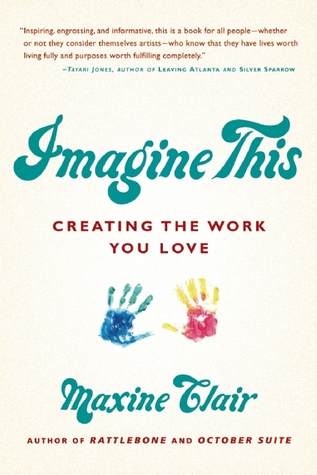Whereas Ann Patchett’s essay was written for people who are specifically interested in writing – either in her own process of writing or the ways in which her process might serve as a model for their own – Maxine Clair’s 2014 book is written for people who are interested in exploring their own creativity.
Whether because they have never had a creative outlet or because their creative aspirations have taken a back seat to other aspects of life (whether more or less satisfying): Imagine This is about taking the opportunity to imagine alternatives.
Each chapter begins with an epigraph. For instance, Mary Oliver heralds chapter nine:
“Pay
attention.
Be astonished.
Tell about it.”
The epigraphs are designed to act as a way of probing your thoughts on how you engage with the world around you, which suits a book preoccupied with the inner life.
The narrative is partly rooted in the author’s personal experience and partly in a broader commentary related to the aspect of her life under discussion. Her autobiographical writing is unsentimental and matter-of-fact, avoiding the nitty-gritty and concentrating on the patterns she has observed as she gradually moved towards fulfillment. The commentary takes a step back from her personal life and invites readers to situate their own experience in this broader perspective.
Finally, each chapter ends with a series of exercises, prompts and queries designed to encourage readers to explore. At the end, there is a short interview and a list of sources (which one could approach as a reading list, although an actual list would have been helpful).
Much of the material here is familiar, but the tone strikes a satisfying balance between informal and informative. Imagine This is also delightfully jargon-free. One does not have the sense that she is simply looking to capitalize on the insecurities and disappointments which can drive the despairing towards the shelves of self-help and personal growth.
“It can be tempting to linger in maybe-land, savoring the satisfaction of having made a choice, but shying away from commitment. The business of consciously committing your mind, body, and spirit to a new creative expression requires stepping up your energy over time to both develop and sustain new habits.”
Although the book is clearly written with a varied audience in mind, I found the growth of her creative work as a writer (through a helpful exchange with Toni Morrison, a confrontation with a discouraging and critical English professor, and her early experiences with publication) of particular interest and the joy with which she practices her craft is inspiring.
Good stuff for writers.
Clair, Maxine. Imagine This: Creating the Work You Love (Agate Bolden, 2014)

